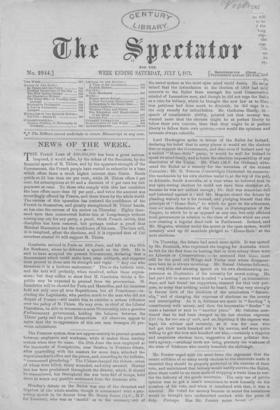Monday's debate on the Ballot was one of the dreariest
and 'frigidest of the whole session, though it commenced with a pro- mising speech in its favour from Mr. Henry James (Q.C., M.P. for Taunton), who was as candid' as to the necessary evil of
the secret system as the most open mind could desire. He mEag tained that the intimidation at the election of 1868 had mfiar converts to the Ballot from amongst the most Conservatiur minded of Lancashire men, and though he did not urge the Ball e as a cure for bribery, which he thought the new law as to Eles tion petitions had done much to diminish, he did urge it s. the only remedy for intimidation. Mr. Gathorne Hardy, in - speech of considerable ability, pointed out that secrecy was wanted more that the electors might be at perfect liberty to
follow their own interests, than that they might be at perfect liberty to follow their own opinions,--uor would the opinions and interests always coincide.


































